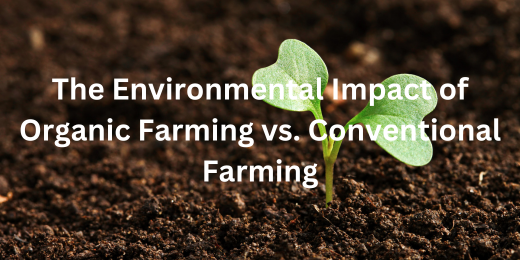
The Environmental Impact of Organic Farming vs. Conventional Farming
Organic farming vs conventional farming
Soil Health and Biodiversity
Organic farming prioritizes soil health through practices that prevent soil erosion and enhance soil structure, unlike conventional farming which can contribute to soil degradation. By fostering a diverse ecosystem, organic farms support a wider range of plant and animal life, enhancing overall biodiversity. Organic farming vs conventional farming shows significant differences in soil health.
Building and maintaining soil fertility is crucial for sustainable agriculture. Organic farming relies on natural methods like composting and crop rotation to improve soil fertility, while conventional farming heavily depends on chemical fertilizers. The long-term production and health of the soil are greatly impacted by these distinct methods.
Protecting our planet requires careful consideration of agricultural practices. Organic farming emphasizes biodiversity conservation by creating habitats for various organisms, contributing to a healthier environmental impact of organic farming. Conventional farming often relies on methods that can disrupt ecological balance.
Water Quality and Conservation
Organic farming helps protect water quality by avoiding chemical pesticides and fertilizers, which can contaminate water bodies. Unlike conventional farming, organic practices minimize water pollution, safeguarding aquatic ecosystems. The distinction between conventional and organic farming significantly affects water quality, influencing the health of aquatic ecosystems and availability of clean water.
Water is a precious resource. Water-saving methods, including effective irrigation systems, are frequently used in organic farming to save water consumption. This responsible approach to water conservation is crucial for sustainable agriculture. The environmental impact of organic farming includes better water conservation.
Healthy soil is crucial for effective water management, as it enhances water retention, reduces runoff, and supports overall ecosystem health. Organic farming practices enhance soil structure, improving its ability to absorb and retain water. This helps prevent water runoff and contributes to overall water conservation efforts.
Greenhouse Gas Emissions
Organic farming plays a crucial role in mitigating climate change by sequestering carbon dioxide in the soil, reducing the overall carbon footprint. Unlike conventional farming, organic systems often rely on renewable energy sources, thereby decreasing fossil fuel consumption. Comparing organic farming vs conventional farming reveals distinct differences in greenhouse gas emissions, highlighting the environmental benefits of organic practices.
Conventional farming often contributes to higher greenhouse gas emissions due to heavy reliance on synthetic fertilizers and machinery. Organic farming prioritizes energy efficiency and reduces dependence on fossil fuels, thereby minimizing its ecological impact. The environmental impact of organic farming includes lower energy consumption.
Livestock management practices significantly influence greenhouse gas emissions. Organic farming emphasizes animal welfare and often adopts pasture-based systems, which can reduce methane emissions compared to intensive livestock production in conventional agriculture.
Pesticide Use and Human Health
Organic farming prioritizes human health by eliminating the use of synthetic pesticides, minimizing exposure to harmful chemical residues found in conventional produce. Organic farming encourages beneficial insects to naturally control pests by increasing biodiversity, which lessens the requirement for chemical interventions. Organic farming vs conventional farming reveals stark contrasts in pesticide use and its effects on human health.
The widespread use of pesticides in conventional farming poses potential risks to human health. Organic farming offers a safer alternative by minimizing pesticide exposure, contributing to improved public health outcomes for consumers. The environmental impact of organic farming also includes promoting beneficial insects.
Protecting human health is paramount. Organic farming plays a vital role by reducing reliance on synthetic pesticides, safeguarding both farmers and consumers from potential health risks associated with chemical residues. The emphasis on natural methods makes organic farming a safer choice for both people and the environment.
Economic Impact and Sustainability
Organic farming often offers higher profit margins for farmers due to premium prices for organic products, contributing to improved farmer income. By supporting local producers and reducing reliance on imported goods, organic agriculture strengthens local economies. Organic farming vs conventional farming highlights economic differences for farmers.
Unlike conventional farming systems that prioritize short-term gains, organic farming focuses on long-term sustainability. By building healthy soil, promoting biodiversity, and reducing reliance on synthetic inputs, organic practices ensure the health of the atmosphere for future generations.
The environmental impact of organic farming also positively influences local economies by promoting sustainable practices and supporting community growth.
Organic farming contributes to economic resilience by creating jobs and supporting rural communities. By reducing dependence on external inputs, organic agriculture strengthens local economies and fosters a more sustainable economic impact compared to conventional farming.
Consumer Preferences and Choices
Consumer preferences are shifting towards healthier and more sustainable options. Many individuals choose organic farming products due to concerns about chemical residues present in conventionally grown food. These consumers prioritize health and well-being in their food choices. Organic farming vs conventional farming reflects consumer preferences and choices driven by health concerns.
The demand for items from organic farms is rising as consumers become more conscious of environmental issues. Customers are becoming more aware of how organic farming benefits the environment and how it improves biodiversity, soil health, and water conservation.
Taste and quality are important factors influencing consumer decisions. While individual preferences vary, many people believe that organic farming produces food with superior taste and nutritional value. This perception drives consumer demand for organic products.
Delve deeper into the world of organic farming and discover exceptional organic products at your nearest Uyir Organic Farmers Market, or browse their online selection at www.uyironline.in or www.uyirorganic.farm.